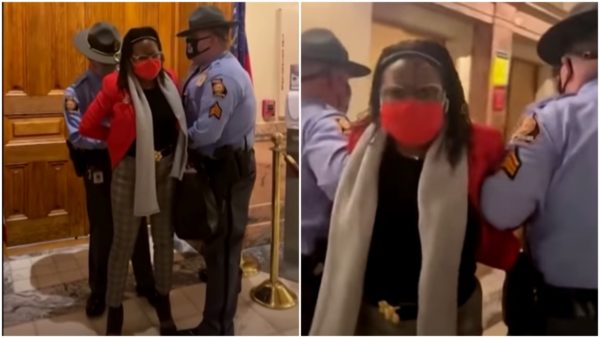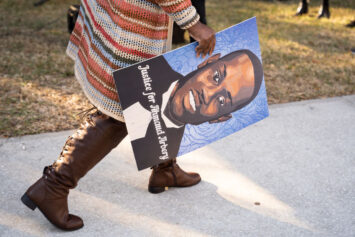A Georgia State Patrol lieutenant who arrested a state lawmaker for knocking on the door of Gov. Brian Kemp’s office while he signed a controversial elections bill into law last week said he feared the representative’s actions would spark a repeat of the Jan. 6 U.S. Capitol riot.
Lt. G.D. Langford said he was worried state Rep. Park Cannon might incite violence from protesters by knocking on Kemp’s door in the Georgia Capitol building as SB 202, a GOP-backed bill that introduced new voter ID laws and restrictions on absentee voting, was signed into law on March 25.

“The events of January 6, 2021 at the U.S. Capitol were in the back of my mind,” Langford wrote in a 13-page incident report obtained by The Atlanta Journal-Constitution.
More than 388 arrests have resulted from the violent storming of the Capitol earlier this year which left five people dead.
Langford wrote in a report about the situation involving Cannon that he was worried about a group of protesters that had congregated in the lobby and “began to get louder as she was refusing to follow my commands.” He said, “I didn’t want the protestors to attempt to gain entry into a secure part of the Capitol.”
In a statement on March 25, Georgia State Patrol said that at 6:33 p.m., Cannon “was beating on the door to the Governor’s Office,” and, when told to stop, moved on to the governor’s ceremonial office door marked with a “Governor’s Staff Only” sign and knocked lightly on that door as Kemp was inside presenting a video livestream about the bill he had just signed.
Footage shared widely on social media shows Langford grab Cannon by her right wrist and lead her into an elevator and out of the building with the help of another trooper.
“I didn’t want the protestors to attempt to gain entry into a secure part of the Capitol,” Langford wrote. “I believed Cannon’s actions of obstructing law enforcement in front of agitated protestors to constitute a breach of the peace.”
Kemp staff personnel apparently echoed the claims Langford expressed in his report, as described by the AJC:
Sgt. N. Jenkins said a panicked Kemp staffer told him to “lock the office down and move the Governor and First Lady from the Ceremonial Office as the side door was shaking so violently, he felt it would be breached.”
And Officer Vince Mooney said he was inside Kemp’s office when a staffer told him “the crowd was attempting to breach the wooden doors” that Cannon had been knocking.
“We briefly secured the Governor and First Lady for a short period of time and resumed his live conference a short time later,” Mooney said.
Video evidence of Cannon’s arrest displayed no touches on the door except for Cannon’s polite knocks.
Cannon was charged with two felonies, obstruction of law enforcement and disruption of the General Assembly.
Her attorney said the charges aren’t warranted. “This was a law enforcement overreach on all the charges, and my hope is that after examining the file, the district attorney will dismiss the charges,” said Cannon’s attorney, Gerald Griggs.
Langford said in the incident report that he removed Cannon from outside the governor’s door and urged her to “stop making it worse.” He alleges she stomped on his foot multiple times in high heels while he and the other trooper removed her from the building, which left him with bruises on his foot and scuffs on his boot.
But Griggs disputed the allegations.
“I’ve tried a lot of cases. It’s not often that the witnesses and the cameras saw everything that transpired,” said Griggs. “Those alleged injuries — if there are any — are not consistent with the witnesses, the evidence or the video.”
The elections law, which Kemp called an expansion of “the right to vote in Georgia” has been likened by critics to Jim Crow-era laws.
The Georgia law requires an ID to vote absentee by mail and limits both the amount of time voters have to request an absentee ballot and where ballot drop boxes can be placed. It also makes it illegal to approach voters in line and provide them with food or water.
“We are witnessing right now a massive and unabashed assault on voting rights unlike anything we’ve seen since the Jim Crow era,” said Democratic state Senate Minority Leader Gloria Butler.


